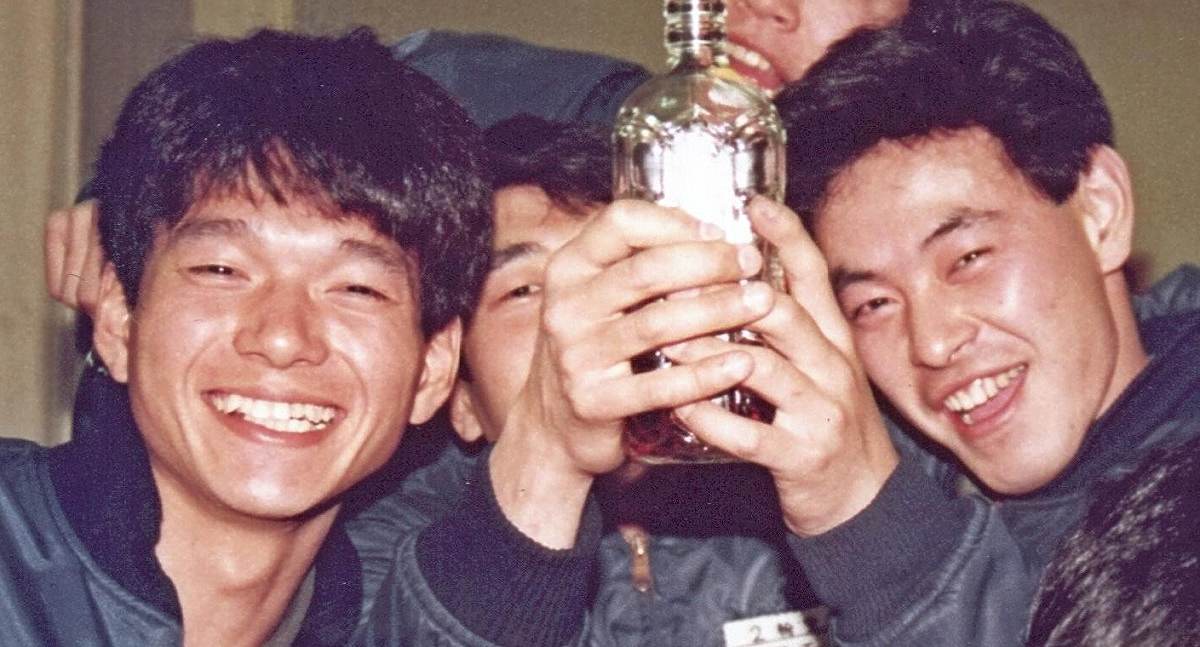Japan Coast Guard Men Mourned After Haneda Airport Crash; Praised for Dedication and Skills: ‘We Lost Valuable Staff’

Shigeaki Kato, right, a Japan Coast Guard member who died in a plane collision at Haneda Airport on Tuesday, is seen with Norio Ando, left, when they served together at the Air Self-Defense Force’s Iruma Air Base in Saitama Prefecture.
14:39 JST, January 5, 2024
A former superior and a friend mourned the sudden death of five crew members who were aboard a Japan Coast Guard aircraft that collided with a Japan Airlines passenger plane on a Haneda Airport runway on Tuesday.
The tragedy occurred while the crew were on a mission to deliver relief supplies to areas hit by the Noto Peninsula Earthquake.
“He was a trustworthy, honest and hard-working man,” said Fumiyoshi Soma, 71, a former supervisor of one of the victims, search radar operator Wataru Tatewaki, 39.
Soma, from Matsumae, Hokkaido, was the captain of the patrol vessel Horobetsu of the Otaru Coast Guard Office in Hokkaido for two years from April 2010. He worked closely with Tatewaki, who was the vessel’s assistant radio operator.
Soma has a strong memory of Tatewaki sweating while standing guard on a beach in the summer. Because many accidents were reported in a no-swimming zone in the area under the office’s jurisdiction, the vessel’s divers monitored the area from the sea from July to August, while Tatewaki and others monitored the area from the beach. Many of the crew members were young, and used to run in local marathons together.
“Since ‘Tatewaki’ is such an uncommon name, I thought he might’ve been on board and checked with his old crewmates,” Soma said. “We lost valuable staff.”
Another victim, mechanic Shigeaki Kato, 56, joined the JCG in January 2022 after serving in the Air Self-Defense Force.
More than 30 years ago, Norio Ando, also 56, now an advisor to the general incorporated association Tokyo Business Club, served with Kato at the ASDF’s Iruma Air Base in Saitama Prefecture.
“He was a good friend; we were eating and bunking together and talking about our dreams,” Ando said.
Ando said Kato was assigned to Iruma Air Base as a mechanic. He was so dedicated to his work that he read maintenance manuals even when not on duty, and had earned respect from his colleagues.
“He was a mechanic by nature and cannot depend on others,” Ando said. “He took pride in his work as a mechanic who had people’s lives in his hands.”
Kato and Ando hit it off so well that they moved out of the dormitory and rented a house together, sharing a room. Ando quit the ASDF four years after joining, and the two had grown apart since then.
“I wanted to talk with him about what we were up to when we met sometime, but I can no longer do that. That is sad,” Ando said.
According to the JCG, the other three who died were copilot Nobuyuki Tahara, 41, an executive officer who took the Japan Coast Guard Academy’s Officer Candidate Course; Yoshiki Ishida, 27, who graduated from the Japan Coast Guard School’s information system course and became a radio operator; and mechanic Makoto Uno, 47, who worked at bases and elsewhere throughout Japan.
Top Articles in Society
-

JAL, ANA Cancel Flights During 3-day Holiday Weekend due to Blizzard
-

Record-Breaking Snow Cripples Public Transport in Hokkaido; 7,000 People Stay Overnight at New Chitose Airport
-

Australian Woman Dies After Mishap on Ski Lift in Nagano Prefecture
-

Foreign Snowboarder in Serious Condition After Hanging in Midair from Chairlift in Nagano Prefecture
-

Train Services in Tokyo Resume Following Power Outage That Suspended Yamanote, Keihin-Tohoku Lines (Update 4)
JN ACCESS RANKING
-

Univ. in Japan, Tokyo-Based Startup to Develop Satellite for Disaster Prevention Measures, Bears
-

JAL, ANA Cancel Flights During 3-day Holiday Weekend due to Blizzard
-

China Confirmed to Be Operating Drilling Vessel Near Japan-China Median Line
-

China Eyes Rare Earth Foothold in Malaysia to Maintain Dominance, Counter Japan, U.S.
-

Japan Institute to Use Domestic Commercial Optical Lattice Clock to Set Japan Standard Time





















